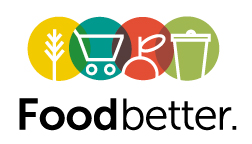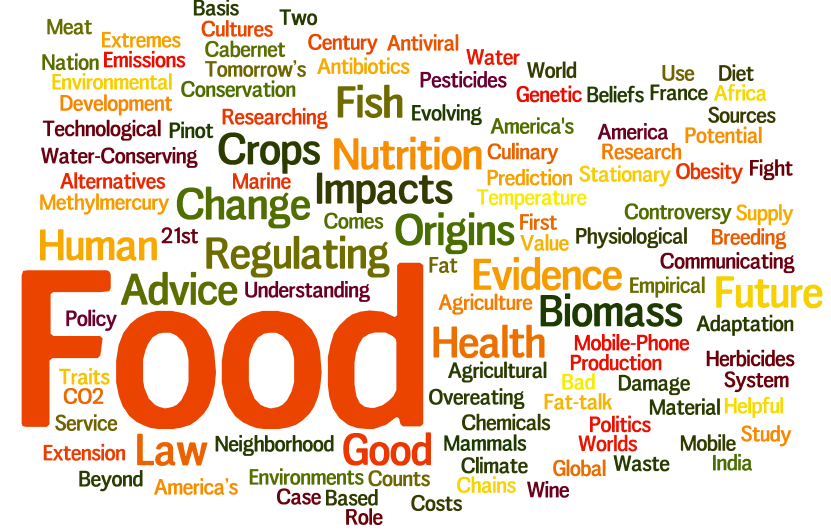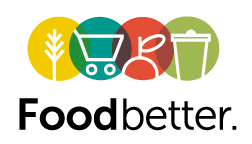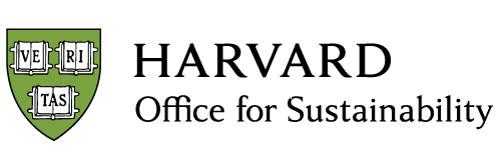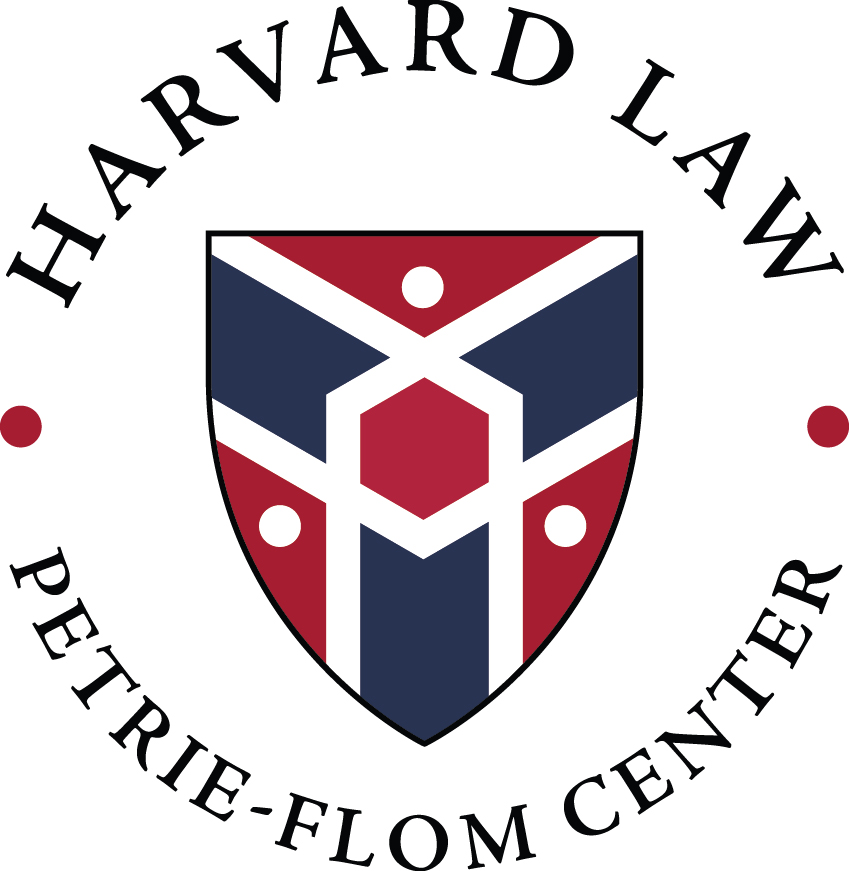Harvard Food+ Research Symposium
february 27, 2015
Download the Symposium Summary Report here.
The Harvard Research Symposium on the Nexus of Food, Agriculture, Environment, Health, and Society (or as we call it, the Food+ Symposium) was held on February 27, 2015 in the university’s Geology Museum Lecture Hall. The goal of the Symposium was to provide attendees with a sense of the excitement and breadth of the Food+ research underway at Harvard and foster cross-fertilization among researchers.
More than 20 Harvard faculty members from 8 schools and a dozen departments gave 7 minute "speed presentations" on their current Food+ research. An audience of more than 250 students, faculty, staff, and citizens from the greater Boston community attended. To get a better idea of the breadth of faculty, staff, affiliates, and graduate students working on Food+ issues, please see our preliminary Harvard Food+ Database. We will be refining, expanding, soliciting feedback, and moving it to a permanent home in the coming year.
The symposium agenda, including the names and affiliations of participating faculty and the titles of their talks, is available in PDF form here. The list of faculty presenters below includes links to the video file, audio file, presentation abstract, and full powerpoint presentation for each speaker. The full list of audio files can be found on the Harvard University SoundCloud page; the full list of video files can be found on the Harvard University YouTube page; and abstracts for each presentation can also be found by scrolling to the bottom of this page.
Faculty presenters included:
- Robert Bates, Eaton Professor of Politics in the Department of Government at the Faculty of Arts and Sciences: Food Production and Politics in Africa. Abstract Presentation Video Audio
- David E. Bell, George M. Moffett Professor of Agriculture and Business at the Harvard Business School: Evolving Supply Chains. Abstract Video Audio
- Joyce E. Chaplin, James Duncan Phillips Professor of Early American History in the Department of History at the Faculty of Arts and Sciences: Food and America's Material Origins. Abstract Presentation Video Audio
- George Church, Professor of Genetics at the Harvard Medical School: Genetic Alternatives to Pesticides, Herbicides, Antibiotics and Antiviral Chemicals. Abstract Video Audio
- Shawn Cole, Professor at the Harvard Business School and affiliate of the Poverty Action Lab and the NBER: The Value of Advice: Evidence from a Mobile-Phone Based Agricultural Advice Service in India. Abstract Video Audio
- Ann Forsyth, Professor of Urban Planning at the Graduate School of Design: Neighborhood Food Environments and Beyond. Abstract
- Jacob E. Gersen, Professor of Law and Affiliated Professor of Government at the Harvard Law School and Director of the Food Law Lab at the Petrie-Flom Center: On Food Law & Food Beliefs. Abstract Presentation Video Audio
- Susan Greenhalgh, Professor of Anthropology in the Department of Anthropology at the Faculty of Arts and Sciences: Fat-Talk Nation: The Human Costs of America's Fight Against Fat. Abstract Presentation Video Audio
- Ray Goldberg, George M. Moffett Professor of Agriculture and Business (Emeritus) at the Harvard Business School: Closing Remarks. Video
- Michele (Missy) Holbrook, Charles Bullard Professor of Forestry in the Department of Organismic and Evolutionary Biology at the Faculty of Arts and Sciences: Breeding Water-Conserving Crops: Why Understanding the Physiological Basis of Water Conservation Traits in Helpful. Abstract Presentation Video Audio
- Peter Huybers, Professor in the Department of Earth and Planetary Sciences at the Faculty of Arts and Sciences and the School of Engineering and Applied Sciences: Crops and Temperature Extremes: Damage, Prediction, and Adaptation. Abstract Presentation Video Audio
- Sheila Jasanoff, Pforzheimer Professor of Science and Technology Studies at the Harvard Kennedy School of Government: Between Two Worlds: Technological Controversy and the Future of Food. Abstract Presentation Video Audio
- Michael Kremer, Gates Profess or of Developing Societies in the Department of Economics at the Faculty of Arts and Sciences: The Potential for Mobile Agricultural Extension. Abstract Presentation Video Audio
- Emily M. Broad Leib, Lecturer on Law and Director of the Harvard Food Law and Policy Clinic at the Harvard Law School: The Role of Law and Policy Research in Our Food System: Case Study on Food Waste. Abstract Presentation Video Audio
- David S. Ludwig, Director of the New Balance Foundation Obesity Prevention Center at the Boston Children's Hospital, Professor of Pediatrics at the Harvard Medical School, and Professor of Nutrition at the Harvard School of Public Health: Which Comes First, Overeating or Obesity? Abstract Presentation Video Audio
- Samuel S. Myers, Senior Research Scientist in the Department of Nutrition at the Harvard School of Public Health: Impacts of Global Environmental Change on Human Nutrition. Abstract Presentation Video Audio
- P.K. Newby, Instructor in the Program in Sustainability and Environmental Management at the Harvard Extension School: Researching & Communicating Nutrition in the 21st Century. Abstract Presentation Video Audio
- Robert Paarlberg, Adjunct Professor of Public Policy at the Harvard Kennedy School of Government: Regulating Tomorrow's World of Meat and Fish. Abstract Presentation Video Audio
- Daniel Schrag, Director of the Harvard University Center for the Environment, Sturgis Hooper Professor of Geology, and Professor of Environmental Science and Engineering at FAS: Report to the President on Agricultural Preparedness and the Agricultural Research Enterprise. Presentation Video Audio
- Elsie Sunderland, Associate Professor of Environmental Science and Engineering at the School of Engineering and Applied Sciences and the Department of Environmental Health at the Harvard School of Public Health: Health Impacts of Methylmercury in Fish and Marine Mammals. Abstract Presentation Video Audio
- Gunnar Trumbull, Philip Caldwell Professor of Business Administration at the Harvard Business School: Good Food, Bad Food: The Origins of Culinary Cultures in France and America. Presentation Video Audio
- Walter C. Willett, Professor and Chair in the Department of Nutrition at the School of Public Health: Development of Empirical Evidence on Diet and Health. Abstract Presentation Video Audio
- Elizabeth M. Wolkovich, Assistant Professor of Organismic and Evolutionary Biology at the Arnold Arboretum: From Pinot to Cabernet: The Future of Good Wine with Climate Change. Abstract Video Audio
Thank you to our Steering Committee: Aaron Bernstein (HMS), Steven B. Bloomfield (WCFIA), William Clark (HKS), Missy Holbrook (FAS), Peter Huybers (FAS), Emily Broad Leib (HLS), Jess Newman (HKS), Robert Paarlberg (HKS), Forest Reinhardt (HBS), Daniel Schrag (FAS), and Walter Willett (HSPH).
Thank you to our sponsors: The Weatherhead Center for International Affairs, The Harvard University Center for the Environment, the Harvard University Office for Sustainability and the Student Sustainability Grant Program, and the Sustainability Science Program at the Harvard Kennedy School.
Thank you to our co-sponsors: Food Better, The Graduate Association for Food Studies, The Harvard Food Law Society, the Harvard Food Law and Policy Clinic, the Harvard Initiative for the Science of the Human Past, The Harvard Kennedy School Center for Public Leadership, The Harvard Law School Petrie Flom Center, the Harvard Law School Center for Health Law & Policy Innovation, the Harvard T.H. Chan School of Public Health Center for Health and the Global Environment, the Harvard T.H. Chan School of Public Health Department of Nutrition, The HBS Business and Environment Initiative, and the Harvard University Dining Services' Food Literacy Project.
Faculty abstracts
Eaton Professor of Politics, Department of Government, FAS
EMAIL: robert.bates.harvard.edu[at]gmail.com
The Politics of Agricultural Policy in Africa.
ABSTRACT: In the decades after independence, many states in Africa became poorer; they turned authoritarian; the policies of their governments exhibited urban bias; and while peopled largely by farmers, Africa imported much of its food. Scholars, including myself, probed the roots of their economic decline and hypothesized that they lay in Africa's politics.
More recently, Africa's economies have revived, propelled in significant part by the revival of agriculture. Systematic research strongly suggests that politics again plays a major role. The return of party competition, it has been found, means that those competing for power now have to counter to the interests of farmers, who constitute the majority of the electorate. Politicians therefore have a strong incentive to endorse policies that promote the interests of those who produce rather than those who purchase agricultural crops.
Changes in political institutions in Africa thus produce a change in political incentives; the change in political incentives seems to have led to a change in public policies; and the change in policies appear to have affected the behavior of farmers.
George M. Moffett Professor of Agriculture and Business, HBS
EMAIL: dbell[at]hbs.edu
Supply Chains.
ABSTRACT: Prof. Bell discussed three trends that affect the trading of commodities in the world today. The first is a move away from crops as commodities: crops are increasingly being segregated and tracked both for food safety reasons but also because of consumer demands for different food types. The second trend is a renewed interest in self-sufficiency by nations. The international trading of food is economically optimal but not if it leaves a country exposed to disruption. Finally there is the problem of correlated risk: as communications improve, consumers and countries react to events in coordinated ways, creating large swings in supply and demand.
Lecturer on Law, HLS; Director, Harvard Food Law and Policy Clinic
EMAIL: ebroad[at]law.harvard.edu
The Role of Law and Policy Research in Our Food System; Case Study on Food Waste.
ABSTRACT: This presentation will discuss how law and policy can contribute to efforts to improve the health and environmental impacts of our food system. I will discuss key tools lawyers bring to this work and describe my research and practice utilizing such tools to reduce the staggering amount of unnecessary food waste.
James Duncan Phillips Professor of Early American History, History Department, FAS
EMAIL: chaplin[at]fas.harvard.edu
Food and America’s Material Origins.
ABSTRACT: The 2013 excavation of cannibalized human remains at the site of Jamestowne Fort in Virginia, where winter hunger killed many colonists during the “Starving Time” of 1609 to 1610, was a dramatic reminder that material scarcity has been an intrinsic part of the American past. The Jamestown discovery joins many other recent prompts to consider food—in its broadest definition, from subsistence cannibalism to modernist cuisine—as part of the academic historian’s remit. This is a significant shift. For a long time, historians preferred to emphasize ideas, agency, and other non-material factors. They feared, however incongruously, that to argue for the place of food in history was, on the “low” end (as with starvation), too materially deterministic or else, on the “high” end (meaning restaurants), too frivolous. Now, however, there is an intriguing rush to examine how America had material as well as ideological origins. This trend is expressed in new work on climate, environment, and natural resources, including food. My contributions include publishing multiple pieces on these topics (most recently a forthcoming co-authored book on Thomas Robert Malthus, the original “Malthusian”), advising dissertations on food and environment, helping two new academic journals in food studies get a start, and teaching food history to undergraduates in the General Education curriculum.
Professor of Genetics, HMS
EMAIL: gmc[at]harvard.edu
Genetic Alternatives to Pesticides, Herbicides, Antibiotics and Antiviral Chemicals.
ABSTRACT: Alternatives are needed for expensive and hazardous doses of chemicals applied to entire ecosystems and the systems fed by water runoff to repeatedly (and temporarily) fight off numerous pests. Genetics can help by changing the types of food production, e.g. vegan/microbial sources with taste and texture equivalent to meat and dairy. A second route is via gene drives which enable intentionally permanent or reversible changes in the pest populations or disease vectors.
Professor, HBS, and affiliate of the Poverty Action Lab and the NBER
EMAIL: scole[at]hbs.edu
The Value of Advice: Evidence from a Mobile-Phone Based Agricultural Advice Service in India.
ABSTRACT: Attempts to explain the astonishing differences in agricultural productivity around the world typically focus on farm size, farmer risk aversion, and credit constraints, with an emphasis on how they might serve to limit technology adoption. This paper takes a different tack: can managerial practices explain this variation in productivity? A randomized evaluation of the introduction of a mobile-phone based agricultural consulting service, “Avaaj Otalo (AO)" to cotton farmers in Gujarat, India, reveals the following. Demand for agricultural advice is high, with over two thirds of treatment farmers calling into the AO line. Farmers offered the service turn less often to other farmers and input sellers for agricultural advice. Management practices change as well: farmers invest more in the most appropriate inputs, make better pesticide and fertilizer decisions. We find dramatic increases in yield for cumin (33%), and improvements in cotton yield (10%) for a sub-group which received frequent reminders to use the service.
Professor of Urban Planning, GSD
EMAIL: aforsyth[at]gsd.harvard.edu
Neighborhood Food Environments and Beyond.
ABSTRACT: My work focuses on the social aspects of physical planning, urban design, and urban development. The big issue behind this research and practice is how to make more sustainable and healthy cities and the site of most of that research has been in suburbs and smaller cities. In my professional work as a planner and urban designer, and in my research, I have come at this problem in several ways—studying places, developing tools, and reflecting on practices.
In the area of healthy places, I started with an interest in walking and physical activity, and transitioned from there to food, making most of my contributions in the area of measuring neighborhood environments. I have created a number of new tools and methods in planning—an urban design inventory, GIS protocols, health impact assessments, survey instruments, and participatory planning techniques. However, neighborhood design, while important, makes a modest contribution to healthy eating and physical activity. This has led me to interested in many other connections between health and place—exposures to contaminants and irritants, accessibility to resources of healthy living, and environmental supports of healthy behaviors. I have worked to translate some of this research for practioner, while highlighting the need to supplement these environmental characteristics interventions at other spatial scales and in programming, education, policy, and pricing.
Professor of Law & Affiliated Professor of Government, HLS; Director, the Food Law Lab at Petrie-Flom
EMAIL: jgersen[at]law.harvard.edu
On Food Law & Food Beliefs.
ABSTRACT: What is food law and how does the law drive the food that is produced, sold, and consumed? In a case involving two producers of pomegranate blueberry juice, the Supreme Court recently held that competitors may sue food companies for labels that are fraudulent or misleading to consumers. In Preference and Perception in the Law of Food, we report on preliminary survey results about how consumer perceptions of food are affected by food labels. The results suggest that most survey respondents were not confused by the allegedly confusing labels at issue in POM Wonderful v. Coca-Cola, and that the dominant driver of purchasing decisions is not perceived quality, nutrition, or juice content, but simply perceived price.
Professor of Anthropology, Anthropology Department, FAS
EMAIL: greenhalgh[at]fas.harvard.edu
Fat-talk Nation: The Human Costs of America's Fight Against Fat.
ABSTRACT: For the last 15 years America has been home to a society-wide “war on fat” in which not just public health authorities, but every sector of society, and all of us as individuals are engaged in constant “fat-talk” aimed at educating, badgering, and shaming heavy people into shedding pounds. We hear a great deal about the health and economic costs of obesity to the nation, but little about the human costs the war on fat itself might be imposing. My anthropological research examines how the war on fat is playing out in society and with what effects on individuals and society. Despite enormous progress in understanding the biology of obesity, efforts to find safe, effective means to prevent and treat obesity have not yet yielded satisfactory results. But the motivation to lose weight is stronger than ever. In American culture, my research suggests, fatness is not primarily about health; it is about morality and political inclusion. While thin, fit people are celebrated as “good biocitizens,” fat people are deemed undeserving of membership in the community of valued Americans. In an analysis of 250 auto-ethnographic narratives of young Californians, I trace the emergence of our country’s first “war-on-fat generation,” a generation obsessed with their bodies and whose most fundamental sense of self comes from their size. The findings, to be published this spring in Fat-talk Nation: The Human Costs of America’s War on Fat, show that regardless of their weight, most feel miserable about their bodies and almost no one is able to lose weight and keep it off. This book shows that the battle against fat, designed to rescue America from obesity-induced national decline, is itself damaging the bodily and emotional health of young people and disrupting families and intimate relationships. The human trauma is disturbing -- and it is virtually unknown. Even as scientific research on obesity continues, we need a cultural revolution aimed at rethinking fat-talk, stopping fat abuse, and dethroning weight as a central measure of human value.
Charles Bullard Professor of Forestry, Department of Organismic and Evolutionary Biology, FAS
EMAIL: holbrook[at]oeb.harvard.edu
Breeding Water-Conserving Crops: Why Understanding the Physiological Basis of Water Conservation Traits is Helpful.
ABSTRACT: Soybean lines that appear less sensitive to drought (delayed wilting phenotype) have around for several decades, but the incorporation of this trait into superior yielding germplasm has been slow due to inconsistent yield performance of progeny lines. Here I report studies begun in my lab in which we found that the slow-wilting phenotype (in PI416937) is the result of limited hydraulic conductivity within the leaf that causes stomatal closure during high atmospheric vapor pressure (VPD). Identification of the hydraulic basis for delayed wilting behavior has allowed the development of screens for the phenotypic expression of this trait in breeding material and thus the commercialization of this "water conservation" trait.
Professor, Department of Earth and Planetary Science, FAS and SEAS
EMAIL: phuybers[at]fas.harvard.edu
Crops and Temperature Extremes: Damage, Prediction, and Adaptation.
ABSTRACT: High temperatures damage crops, and the warming expected in coming decades raises concerns regarding future yields. This talk briefly reviews several lines of work to model crop damage from high temperatures, quantify potential adaptation to hotter conditions, and improve prediction of changes in extreme temperatures.
Sensitivity of US maize yield to high temperature varies by an order-of-magnitude across climate zones. Using this extant adaptation across space as a proxy for adaptability to future warming suggests that production losses in the Southern US from a moderate warming of mean temperature would be counterbalanced by increased Northern production. Changes in other moments of the temperature distribution are also possible, of course, and we identify significant trends in variance and skew to accompany mean warming. Curiously, the hottest growing season temperatures in the US Midwest are found to be trending cooler. Only a small fraction of Midwest cropland is irrigated, and the wider cooling effect appears to be that agricultural intensification is associated with greater capacity for transpiration. Crops increasingly cool ambient air temperature through evaporation, though this moderating effect is lost during drought conditions, whereupon temperatures revert back to historic highs. Finally, in exploring long-range prediction of heat waves, we identify a mode of ocean-atmosphere variability in the mid-latitude Pacific that permits for skillful predictions more than 40 days in advance. If this predictive horizon can be further extended, perhaps through improved ocean forecasting, heat-wave probabilities could be factored into planting decisions.
Pforzheimer Professor of Science and Technology Studies, HKS
EMAIL: Sheila_Jasanoff[at]Harvard.edu
Between Two Worlds: Technological Controversy and the Future of Food.
ABSTRACT: Professor Sheila Jasanoff discusses the factors underlying radically different interpretations of innovation in food technology. What is at stake here? Some claim that GMO technology will improve upon nature - making it more orderly and manageable - thus increasing yield and the capacity to feed the growing global population more efficiently. Others (often dismissed as “neo-luddites”) protest against GMO technology, with undertones of socioeconomic conflict and divergent views about the meaning of nature and the natural. Jasanoff’s research looks cross-nationally and comparatively at the kinds of politics that people have constructed around agricultural technologies. For example, in America, a form of “denialism” has sprung up around GMOs, with experts explaining each episode of accidental release as a fault of disparate social actors rather than of the technology itself. She has found that expectations about how public knowledge should be generated and what constitutes legitimate expertise differ across America, Britain, and Germany. Three salient differences can be identified across these three political cultures: expectations about the relations between politics and expertise; the production of trust around technical claims; and decisions about what kinds of products are appropriate to consume. “What kinds of food do we want?” thus translates into “What kinds of politics and ethics do we want?
Gates Professor of Developing Societies, Department of Economics, FAS
EMAIL: Mkremer[at]fas.harvard.edu
The Potential for Mobile Agriculture Extension.
ABSTRACT: Public agricultural extension services in many developing countries suffer from management and accountability problems, and provide coarse messages that are not tailored to farmer circumstances. Private agricultural extension services are subject to market failures: a service may charge for advice, but that advice can easily be shared, and if a service is supported by commissions its credibility is difficult to assess. A mobile phone based approach could provide information at low marginal cost. Existing research suggests this could potentially increase smallholder farmers’ productivity; facilitate adaptation to changing climate and extreme weather; reduce use of unnecessary pesticides and fertilizer, and improve the operations of contract farming organizations. Information could be tailored to local agro-climatic conditions (soil chemistry, weather forecasts, pest outbreaks), market conditions (input and output availability and prices), and individual farmer characteristics (acres under operation, labor supply, time of planting, education, previous experience). Such a system could allow for a two-way flow of information with farmers on results and experiences. Using machine learning and continuous experimentation, the platform could continuously improve its ability to deliver tailored messages on best practices. Access could potentially made free to farmers by partnering with large-scale contract farming organizations, governments, and donors. There may also be potential for financing via advertising, technology firms, and telcos.
Director, New Balance Foundation Obesity Prevention Center, Boston Children's Hospital; Professor, Pediatrics, HMS; Professor, Nutrition, HSPH
EMAIL: david.ludwig[at]childrens.harvard.edu
Which Comes First, Overeating or Obesity?
ABSTRACT: The conventional approach to weight loss, based on the First Law of Thermodynamics, considers obesity a simple problem of calorie imbalance: too many consumed, not enough expended. Because fat has twice the calorie content of the other major nutrients, the mainstay of obesity treatment for the last half century has been the low fat diet. Unfortunately, this approach has shown exceptionally poor long-term effectiveness in practice.
This conventional approach disregards decades of research into the biological control of body weight. Feeding studies show that simple calorie reduction elicits physiological adaptations – increasing hunger and decreasing metabolic rate – that antagonize weight loss over the long term. According to an alternative hypothesis, the anabolic state of fat cells plays a dominant role in the control of body weight. When fat cells become excessively anabolic, they take in and store excessive calories. Consequently, the concentration of metabolic fuels in the blood stream declines, triggering the starvation response.
Numerous factors in the environment affect the anabolic state of fat cells, but chief among them is consumption of processed carbohydrate, including refined grains, potato products and concentrated sugar. These high glycemic load foods stimulate, calorie for calorie, more insulin secretion than unprocessed carbohydrates, protein or fat. Thus, the increasing amount and processing of dietary carbohydrate may have elicited adverse biological changes in the US population and driven the obesity epidemic. If this hypothesis is true, than a focus on dietary quality, rather than calorie balance, would produce better results in the long-term treatment of obesity.
Senior Research Scientist, Department of Environmental Health, HSPH
Clinical Instructor, HMS
EMAIL: sam_myers[at]hms.harvard.edu
Impacts of Global Environmental Change on Human Nutrition.
ABSTRACT: The research I do with the greatest relevance to the Food Plus Symposium is a series of investigations into the nutritional and health implications of large-scale, anthropogenic environmental change. My group has evaluated the impact of rising concentrations of atmospheric CO2 on the nutritional value of important food crops by building a large dataset of 41 cultivars of six important food crops grown in 7 locations on 3 continents over 10 years at both ambient and elevated (roughly 550 ppm) CO2. We found significant reductions in iron, zinc, and protein in these crops in response to concentrations of CO2 that the world will experience within the next 40-50 years. We have also been studying the impacts of pollinator declines on human nutrition and health outcomes in a global analysis which calculates burden of disease for each of 160 countries in response to different pollinator decline scenarios. Finally, we have been studying how declines in both terrestrial and marine wildlife populations would impact nutrient intake and health outcomes. We are doing this at a fine scale in Madagascar where we are collecting data on dietary intake, wildlife population dynamics, and biological samples (blood, breast milk, blood spot, malaria and parasitology testing, and fecal samples) from 750 individuals over time. We are also conducting a global analysis of the ways in which fisheries management and fisheries declines would impact nutrient intakes and health outcomes for populations around the world.
Scientist. Educator. Author. Food Expert. Cook. pknewby.com; Instructor, Harvard Extension School Program in Sustainability and Environmental Management
EMAIL: pkn[at]pknewby.com
Researching & Communicating Nutrition in the 21st Century.
ABSTRACT: From the earliest discoveries of vitamins and minerals, nutrition science has traditionally relied upon reductionism to answer significant questions of diet and health. Still today reductionist thinking pervades the discipline, as embodied in the “single nutrient paradigm” that dominates nutritional epidemiologic research. Dependence upon reductionist thinking has limited our ability to uncover dietary truths and effectively communicate life-saving research results. In essence, reductionism does not account for the complexity of food itself, which includes myriad elements that work in concert to impact health—nor does it reflect how people actually eat. The notion of examining diet as a whole rather than as individual nutrients or foods is based on the theory that the entire diet is the principal determinant of health, particularly in matters of chronic disease prevention. Novel methods to study “dietary patterns” emerged in the 1980s and exploded in the past decade, expanding greatly the ways in which nutrition studies are conducted. This growing body of literature has revealed that a plant-based diet is related to a decreased risk of chronic diseases like obesity, heart disease, and type 2 diabetes. As a result, dietary guidelines and recommendations are increasingly focused on the complete diet rather than single nutrients and are thus more comprehensible to the public. The next big challenge for nutrition is going beyond the individual in the study of why what we eat matters and communicating the science in a way that stimulates food choices that create a healthier planet, as well as healthier people.
Adjunct Professor of Public Policy, HKS
EMAIL: Robert_Paarlberg[at]hks.harvard.edu
Regulating Tomorrow’s World of Meat and Fish.
ABSTRACT: Meat consumption in the developing world will double between now and 2050, and fish consumption will increase rapidly as well (in China fish consumption has been doubling every decade since 1990). These future food needs will be satisfied not through an expansion of traditional barnyard, grazing, and wild catch systems, but from a steady introduction of more highly capitalized and specialized industrial systems, including “factory farm” concentrated animal feeding operations (CAFOs) and farmed fish aquaculture systems.
As these industrial systems expand in the developing world, the regulatory environment will be important. CAFO and aquaculture systems are well regulated for food safety in the United States, but much less so for environmental protection and scarcely at all for antibiotic use (a human health risk) or animal welfare. In Europe, stronger environmental protections are in place, antibiotic use to promote animal weight gain has been banned, and animal welfare standards in some countries (e.g., Germany) are extremely high. For these and other reasons, livestock systems in Europe are high-cost compared to American systems.
My new research project asks if tomorrow’s livestock systems (and aquaculture systems) in the developing countries will follow the American or the European model. Also, will this choice be driven by a global extension of corporate best practices, or by public sector measures? Will the rapid expansion of industrial meat and fish production systems in developing countries produce a regulatory race to the bottom, the top, or the middle?
Director, Harvard University Center for the Environment; Sturgis Hooper Professor of Geology and Professor of Environmental Science and Engineering, FAS
EMAIL: Schrag[at]eps.harvard.edu
Report to the President on Agricultural Preparedness and the Agricultural Research Enterprise.
Associate Professor of Environmental Science and Engineering, SEAS and Department of Environmental Health, HSPH
EMAIL: elsie_sunderland[at]harvard.edu
Health Impacts of Methylmercury in Fish and Marine Mammals.
ABSTRACT: Seafood is an important source of protein and micronutrients, particularly for coastal communities in the north and developing countries. Neurocognitive deficits in children associated with methylmercury exposures are well established. Guidance on seafood consumption is less clear because of the countervailing risks associated with reduced intake of omega-3 fatty acids and other less nutritious food choices. Further, global capture fisheries are presently being harvested close to their maximum capacity. Health risks associated with global contaminants such as methylmercury extend beyond individual seafood consumption choices to the health and sustainability of fisheries. Increasingly, contaminant burdens in the tissues of marine mammals and wild fish globally are exceeding toxicological thresholds that may impact the reproductive success of these species. Fluctuations in fisheries stock abundance are generally attributed to climate change and harvesting activities rather than the direct impacts of contaminants on the health of fisheries themselves. Collapse of global fish stocks due to extreme contaminant levels such as in the coastal basins of contaminated rivers in East Asia poses a serious threat to the health of vulnerable coastal communities that depend on fishing resources.
Philip Caldwell Professor of Business Administration, HBS
EMAIL: Gtrumbull[at]hbs.edu
Good Food, Bad Food: the Origins of Culinary Cultures in France and America.
Professor and Chair, Department of Nutrition, HSPH
Development of Empirical Evidence on Diet and Health.
ABSTRACT: Strong beliefs have long existed about many aspects of diet and health, but until recently little empirical evidence existed. Beginning in 1980, our group at the School of Public Health and Brigham and Women’s Hospital has developed a series of longterm longitudinal studies, now tracking the diets of approximately 300,000 men and women and relating them to incidence of most major causes of morbidity and mortality in the U.S. These studies have also incorporated biomarkers of diet, and more recently have added genomics and metabolomics to understand mechanistic pathways.
Many findings, both hypothesized and unexpected, have emerged from these efforts; these include the relation between trans fat intake and risk of coronary heart disease, the benefits of unsaturated fat intake in prevention of heart disease, the importance of carbohydrate quality in relation to risks of diabetes and cardiovascular disease, and the lack of relation between dietary fat and risk of breast cancer. We have shown that a healthy dietary pattern, together regular physical activity and not smoking, can prevent the large majority of heart disease, diabetes, and some cancers. Recent analyses of major protein sources implicate high consumption of red meat in cardiovascular disease, diabetes, and cancer; thus minimizing consumption of red meat represents an important convergence of human and planetary health.
Assistant Professor of Organismic & Evolutionary Biology at the Arnold Arboretum
EMAIL: wolkovich[at]fas.harvard.edu
From Pinot to Cabernet: The Future of Good Wine with Climate Change.
ABSTRACT: Winegrapes (Vitis vinifera ssp. vinifera) are one of the world's most lucrative and important crops, and also one of the most responsive to climate, with some researchers suggesting terroir equates to climate. A major way this climate sensitivity is exhibited is through phenology---especially the timing of flowering, veraison and harvest---with winegrape harvest dates serving as temperature proxies they are often so tightly related. I will give an overview of work in my lab discussing (1) exploiting the phenological hyperdiversity of winegrapes to better understand what other plant traits may covary with phenological responses to climate, and (2) our efforts using long-term harvest records from across France with reconstructions of temperature and drought to examine the drivers of early harvest over the previous centuries and more recently. I will show how suggest climate change may have fundamentally altered the drivers of early winegrape harvests across France, but also highlight how differences in how varieties respond to climate may provide some buffering from dramatic changes in winegrape regions, given proper advanced management.
